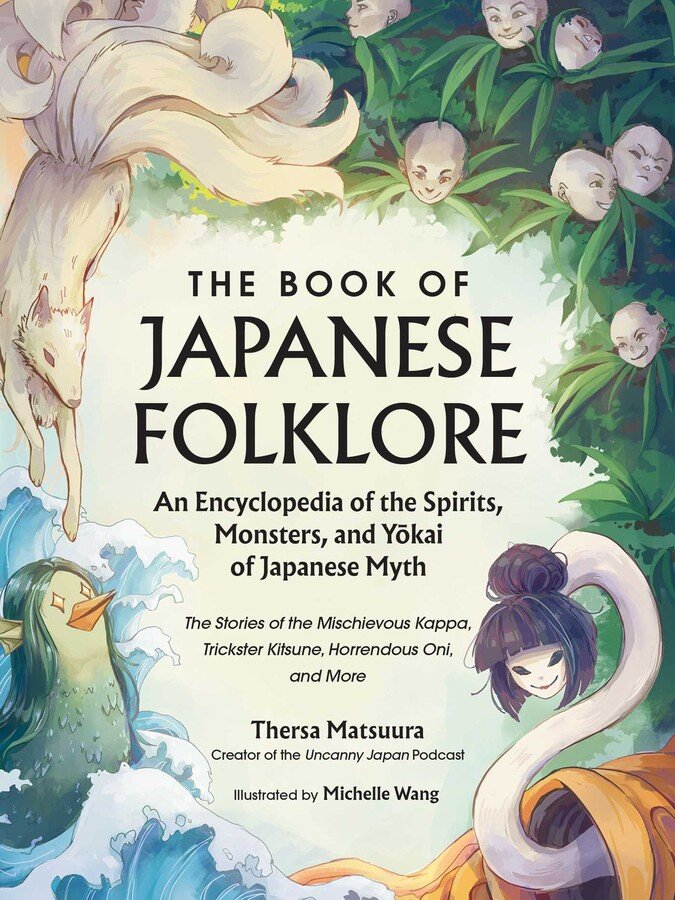Interview: The Book of Japanese Folklore by Thersa Matsuura
At MBC we love finding women authors who have applied themselves to many different avenues. We had the pleasure of interviewing Thersa Matsuura, who recently released The Book of Japanese Folklore: An Encyclopedia of the Spirits, Monsters, and Yōkai of Japanese Myth.
Thersa Matsuura is an American expat who has lived in Japan for over thirty years. Her fluency in the language allows her to explore her favourite part of Japanese culture: all the myths, legends, folktales, and superstitions.
Thersa retells these Japanese folktales and ghost stories on her popular podcast Uncanny Japan. Thersa has also published two short story collections, including A Robe of Feathers and Other Stories and The Carp-Faced Boy and Other Tales, a collection of horror stories inspired by Japanese folktales, which was nominated for a Bram Stoker Award in 2017.
The Book of Japanese Folklore (An Encyclopedia of the Spirits, Monsters, and Yōkai of Japanese Myth)
Welcome to The Book of Japanese Folklore: a fascinating journey through Japan’s folklore through profiles of the legendary creatures and beings who continue to live on in pop culture today.
From the sly kitsune to the orgrish oni and mischievous shape-shifting tanuki, learn all about the origins of these fantastical and mythical creatures. With information on their cultural significance, a retelling of a popular tale tied to that particular yokai, and how it’s been spun into today’s popular culture, this beautifully illustrated tome teaches you about the stories and histories of the beings that inspired characters in your favorite movies, animes, manga, and games.
INTERVIEW WITH THERSA MATSUURA
Amanda Guarragi: What inspired you to write this non-fiction compilation of Japanese mythology and folklore?
Thersa Matsuura: It’s funny because while I adore Japanese mythology and folklore and spend a lot of time reading and researching it, I’ve always considered myself a pure fiction writer. In that, I dig up all these obscure and wonderful story bits, beastly creatures and old superstitions and I turn those into short stories.
I’m not an academic or scholar, I never considered writing such a compilation until the acquisitions editor for Adams Media emailed me and asked if I’d want to pitch the idea to the higher-ups. That got me thinking about what I could do differently than books already out there — what unique take could I bring — and suddenly I wanted to write this book more than anything!
Two things I hoped to do that I hadn’t seen done before: I wanted to have the Japanese characters (kanji) included in the book for the yōkai and certain key terms, places, and phrases because I get quite a bit of feedback from Japanese language learners who go to the show notes of the podcast (on the website) for that specific purpose, to learn the kanji and dig deeper into the subjects they’re interested in. I wanted to add something to each of the creatures/characters that I’ve never seen written about in English before. This way lovers of yokai and folklore who are well versed in the subjects could also learn something different and new from the book.
A: What is the most rewarding aspect of this journey for you?
T: I decided to start working from home a couple of months before the world first heard about the COVID-19 virus and then came that long long lockdown, so lost my ability to focus on anything for an extended length of time. All my days were short fragments of jumping from one thing to the next. The deadline for The Book of Japanese Folklore was tight and while I was nervous, I loved the challenge. I can say mentally and “focus-wise" it was the hardest thing I’ve ever done. But it felt so good to get into the routine, dive into the subject, populate my waking hours with all these beasties and their stories, and meet the deadlines.
A: What was your process when assembling your podcast versus writing the book, did any of your tactics cross over?
T: With the podcast I choose the topic for the show by how I’m feeling at the time. If it’s been raining all week, I think, Hmm…I want to research the little teru teru bozu talisman that is supposed to stop rain. Then I go down that rabbit hole for a couple of weeks, taking notes and putting the show together. The research for the book was similar but because I didn’t have so much time for each chapter, I tried to be super organized before I even started. I gathered all my research material and put tons of post-it notes in books to let me know where I needed to go for different topics and I was very strict with my time. I wrote all morning, did rewrites and edits of the previous day’s chapter in the afternoon, and then read and took notes on the next day’s creature until I fell asleep. If I woke up in the middle of the night, I edited or wrote on my phone. My entire life was yōkai. It was surreal.
A: What are you hoping readers gain from your new release?
T: All these creatures and stories are so, so deep and rich. I hope that readers can also come away with that feeling and maybe want to roll up their sleeves and learn more about their favourites.
A: What’s the most fascinating aspect of Japanese folklore that has interested you over the years?
T: One thing I still find so fun and fascinating about Japanese yōkai and folklore is how interconnected with history and everyday life they both were and to a lesser extent, still are. How diseases like cholera and smallpox were blamed on specific yōkai or how if someone suddenly came into a bout of bad luck, well, that must be a binbogami or poverty god shacking up in their house. I constantly marvel at how incredible imaginations were back in a time of no electricity when people lived so much closer to nature. An unexplained rattling sound near a river was a red bean washer, a mysterious cut on your leg was from a sickle weasel attack. I still get a huge kick out of learning about stories like this.
A: Out of all the stories you’ve explored which one did you connect with the most?
T: This is a hard one. To some degree, I gravitate toward certain yōkai and their history and stories depending on where I am in my own life. It’s like I go through a kappa stage and then a tengu stage. One that I feel very connected with and still want to do more research on is the wolf. We all know about the fox (kitsune) but the poor wolf also had a yōkai version and was seen as a kind of god. Sadly they went extinct after Americans came in and poisoned them all, so I want to bring the wolf (okami) back, at least through their majestic stories.
A: Are there any other projects you’re working on?
T: I’ve had a middle-grade fantasy-adventure book knocking around in my head for a couple of years and I finally decided to focus and finish that. At the same time, I’ve recently discovered visual novels and think the whole concept of them is just amazing. There is room to be creative with storytelling and do something new (using artwork, sound design, narration, and a story that changes depending on your choices). So with my partner (he’s all things audio and programming), we’re going to put out a free short visual novel based on my retelling of an old Japanese folktale, then if all goes well, I want to do something longer and more immersive in that genre this year.
A: Since you were a Bram Stoker Award finalist for The Carp-Faced Boy and Other Tales, would you ever want to write a horror novel?
T: Yes! Absolutely! I have ideas and outlines and quite a few novels, audio dramas, and visual novels that I’ve started working on in horror and fantasy. But first, the middle grade I mentioned earlier! I wish I had more time and energy to pursue all my “big ideas.”
If you are a fan of a compilation of short stories, you should pick up The Book of Japanese Folklore: An Encyclopedia of the Spirits, Monsters, and Yōkai of Japanese Myth!
We are always on the lookout for new innovative stories that explore mythology with such depth such as this one. The beauty of the fantasy genre is that it can expand to an entire world of imagination but it can also be rooted in history and lore.
If you want a fun space to discuss your favourite novels, come join our discord today and become a Patreon member for other great book club perks.


